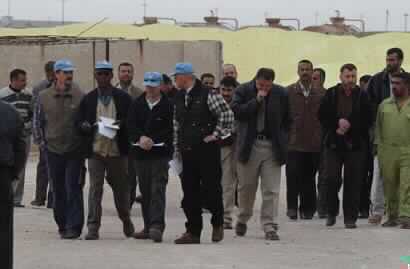U.N. weapons inspectors hunted for banned Iraqi missiles on Wednesday, visiting at least three sites involved in making rockets and their components. The United Nations has not yet said whether it will insist that Iraq modify its Al Samoud 2 missiles, whose range has been found to exceed the 94-mile limit imposed by U.N. resolutions, or will require they be destroyed.
Under the resolutions, all proscribed weapons systems must be destroyed, but inspectors' spokesman Hiro Ueki told The Associated Press on Wednesday that Al Samoud missiles could also be "rendered harmless ... making sure that they cannot be used."
During a visit to Baghdad in January, chief arms inspector Hans Blix said the Iraqis suggested that when they fitted guidance and control systems and other devices to the missiles, they would be weighed down and fly within the legal distance.
Iraq's foreign minister, Naji Sabri, was asked Tuesday night what Iraq would do if told to destroy the missiles. He refused to answer, saying the question was too hypothetical.
Destruction of the Al Samouds would rob President Saddam Hussein's army of a potentially valuable military asset at a time when nearly 250,000 American and British troops have massed in the region in preparation for a possible invasion of Iraq.
The United States and Britain, which accuse Iraq of concealing weapons of mass destruction, plan to press this week for a U.N. Security Council resolution authorizing the use of force to disarm Iraq, U.S. and British diplomats say.
The diplomats, who spoke on condition of anonymity, said they expected the negotiations to be wrapped up by the time Blix delivers his next report on Iraq - March 1.
Ueki said the inspectors in Baghdad already have identified and tagged 380 rocket engines which Blix said were illegally imported by Iraq for use in the al Samoud missiles.
A U.N. spokesman said Wednesday that inspectors were tagging more missiles.
The Iraqi Information Ministry said the weapons inspectors on Wednesday visited the al-Mamoun missile fuel plant and al-Karama complex, which manufactures missile components and guidance systems.
It said the experts also went to "Al Samoud site" and a military site in the al-Taji area north of Baghdad. Inspectors who visited a military unit in al-Taji earlier this week were seen by journalists examining Al Samoud missiles, but it was not immediately clear whether it was same site visited Wednesday.
Iraq was having trouble meeting another U.N. demand: encouraging scientists involved in weapons programs to grant private interviews to inspectors from UNMOVIC, the U.N. Monitoring and Observation Commission led by Blix.
Ueki told reporters Tuesday that only three of 30 scientists invited since the inspectors returned to Iraq in November have been willing to talk to UNMOVIC without a tape recorder - a condition the inspectors insist on because they believe it will make the scientists more candid.
The three scientists who gave interviews were suggested by the Iraqi government - not requested independently by the U.N. team, Ueki said.
A separate team of U.N. nuclear inspectors has conducted more interviews but allowed the scientists to record them.
PHOTO CAPTION
UN weapons inspectors, left with blue caps, walk with members of the Iraqi National Monitoring Directorate and Iraqi workers in front of a pile of sulfur at a private battery acid plant outside of Baghdad, Iraq Tuesday Feb. 18, 2003. (AP Photo/Jassim Mohamme
- Author:
AP - Section:
WORLD HEADLINES


 Home
Home Discover Islam
Discover Islam Quran Recitations
Quran Recitations Lectures
Lectures
 Fatwa
Fatwa Articles
Articles Fiqh
Fiqh E-Books
E-Books Boys & Girls
Boys & Girls  Hajj Rulings
Hajj Rulings Hajj Fatwas
Hajj Fatwas














